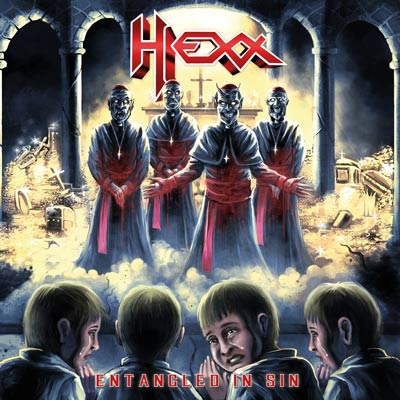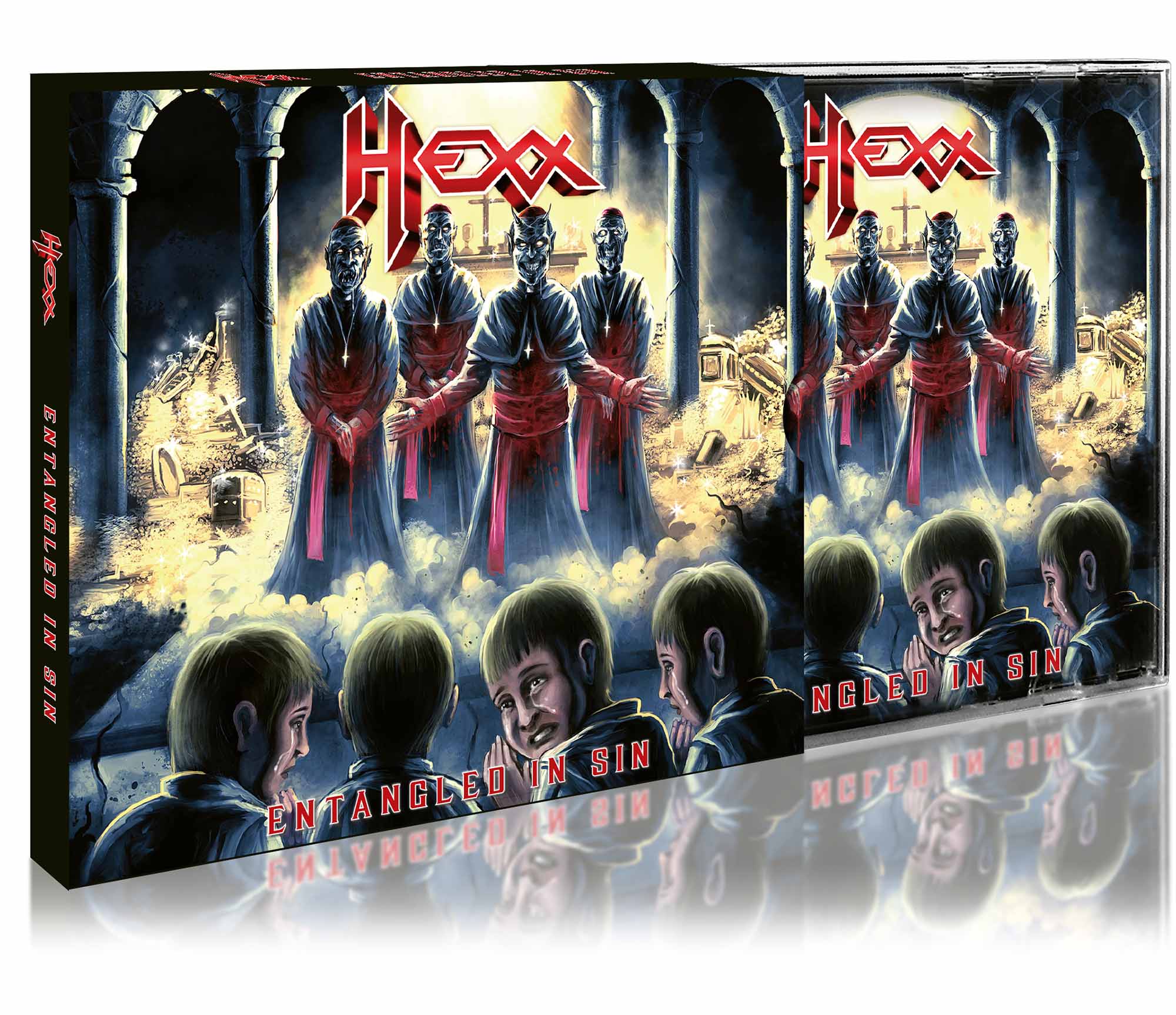 | ||||
| HEXX - Entangled in Sin CD | |
HRR 747 CD, slipcase | |
| Eddy Vega - vocals Dan Watson - guitars Bob Wright - guitars Don Wood - bass John Shafer - drums | |
| 01 Watching Me Burn 02 Entangled in Sin 03 Vultures Gather Round 04 Beautiful Lies 05 Power Mad 06 Internal Enemy 07 Strive the Grave 08 Touch of the Creature 09 Wise to the Ways World 10 Over But the Bleeding 11 Signal 30 I-5 12 Night of Pain 13 Terror | |
SOLD OUT! | |
The infamous Bay Area has a long and extensive metal history. Responsible for many truly groundbreaking acts (just think of Exodus, Testament, Forbidden, Heathen or Blind Illusion) for over three decades now, the city by the bay has spawned some of the most innovative and exceptional talent there is.
Hexx, one of the third-generation power metal bands emerging from San Franciso, were originally formed in late 1984. Their first album entitled »No Escape« was only released in the US (by the legendary Shrapnel label) and began shaping a steadily growing fan base for the band. It was followed by »Under the Spell« and »Quest for Sanity« marking the end of Hexx Mark I.
At that time, internal changes were taking place within the ranks of Hexx that would alter their musical direction quite fundamentally. On the strength of a new song called “Watery Graves“ (released as an EP on Wild Rags Records), Hexx were signed by Century Media Records. The following album, 1991's »Morbid Reality«, marked Hexx's evolution from a more or less traditional speed/power metal band to a brutal, technically-inclined thrash/death metal outfit.
With their comeback record »Wrath Of The Reaper« (issued on High Roller Records in 2017), however, Hexx were returning to their traditional power metal roots. Now, three years later, the Mark III incarnation of Hexx is returning with a brand new studio album entitled »Entangled In Sin«.
Founding member and guitarist Dan Watson brings us up to date with what happened inside the Hexx camp since 2017’s fantastic »Wrath Of The Reaper« record: “We played some shows here in the Bay Area, then we were fortunate enough to be invited to play the ‘Bang Your Head’ festival in Germany. That show was the highlight of the year for us. We spent most of the time after the release of »Wrath Of The Reaper« rehearsing and preparing for our set at the BYH festival. Originally they only wanted us to perform a 50-minute set, then about a month before we were to go they contacted us to ask us to play an almost two-hour set because of the amount of material in our discography. It was funny because we had our shorter set well-rehearsed and we were feeling confident and maybe even a little cocky. Then at the last moment, we had to bust our ass to get it together and rise to the occasion and opportunity of playing a much longer set. It all worked out in the end and we had a great performance. That’s show biz! After we got back from the ‘Bang Your Head’ festival we thought it best to change bass players. Personality conflicts with Mike Horn were becoming a problem and were undermining the group's cool internal vibe and affecting morale. We were lucky enough to trick Don Wood into playing for the band and he has worked out great so far. We are all still on good terms with Mike and we appreciate all his contributions to the group and wish him well.”
“The new album was recorded at the Sonic Room Studios in Livermore California and was engineered by Tim Narducci and produced by Bart Gabriel,” brings us Dan Watson to the new record »Entangled In Sin«. “We put a lot more time and thought into pre-production with this album than we did for the »Wrath Of The Reaper« record. Bart Gabriel was key in helping us during the pre-production process. I would send him demos of potential new songs and he would check them over and advise us on everything from tempo to lyrical content and everything in between. He was a valuable asset to this recording and I will always be grateful to him and the folks at High Roller Records for their support.”
“»Entangled In Sin« is, in my opinion, a better record,” compares Dan Watson the last two Hexx albums. “Not that »Wrath Of The Reaper« is without its moments, but this new album is superior in many ways. Better songs and better production for sure. For this recording, we wrote and rehearsed everything with the click track in mind. We paid special attention to the tempos so that the riffs would flow and grove the way we wanted them to for maximum crushing power. Lyrically, this album also has a more focused message than its predecessor.”
Stylistically the new album is much closer to Hexx’s power metal roots than to the band’s brutal thrash/death metal period. For me it’s a classic US Metal album, going back to the glory days of the 1980s (albeit with a much stronger production)... “Yes, that was our intent from the beginning,” confirms Watson. “We love that classic 80s US Power Metal sound. It is the nearest to our hearts. We did our best to recapture the ‘glory days’ as you put it, but add the experience and expertise we had not yet acquired being young musicians trying to stand out in a sea awash with a multitude of talented acts bubbling up from the ooze of the Bay Area metal scene at that time. Don’t get me wrong, there are some frantic thrashy elements to the new album but I would call this a classic US Power Metal record. I would say the opening track ‘Watching Me Burn’ is a fair cross-cut example of the material on this new album. Although each song is different and has its special place on the record contributing to the overall body of work.”
I might be wrong but a song like “Entangled In Sin” reminds me of classic, prime era Metal Church. Was Metal Church ever a band you cherished? “Oh yeah, of course,” nods Dan Watson. “We could not help but be influenced by a band like that. We never set out to attempt to copy bands that we admire but when your writing new material for an album the bands you love tend to become part of the musical landscape you draw from for ideas. I don’t set out to try and write songs that sound like other bands but I suppose on a subconscious level their influence might find its way into the writing process.”
“Internal Enemy” is one of the more frantic tunes of the record. Another great number on a great album... “’Internal Enemy’ went through a lot of arrangement revisions before we arrived at the final version,” explains the guitarist. “The main riff I’ll admit is inspired by the Scorpions »Lovedrive« era. Bart was encouraging us to submit more up-tempo material so this song was an attempt to satisfy his request. Lyrically the song is about how sometimes we can be our own worst enemy by letting our minds become imprisoned by our own auto deceptive self-delusions.”
“Beautiful Lies” is a very catchy tune, almost true blue traditional heavy metal, would that be a fair description? The main riff is even a bit Saxonish... “When I was writing ‘Beautiful Lies’,” explains Dan Watson, “my thought was, if Hexx had a radio-friendly MTV video hit back in the mid-1980s, what would it sound like? That’s where the catchy chorus comes from. The lyrical content is more socially relevant today I think than it would have been in the 80s. The song reflects on how the beliefs of the masses are suspiciously exactly what we want to hear coming from either our governments or our religions and may not necessarily be the truth. It is designed to get the listener to consider examining their beliefs and to have the courage to question everything asserted by the government and religion.”
There will be a single featuring the song “Night Of Pain” (with “Terror” on the B-Side) out before the album. Neither track will be on the album. “It was Bart Gabriel’s idea to re-record two songs from the band's debut 1984 release »No Escape«”, explains the band’s founding member Dan Watson. “Because of the less than great production of our first effort we thought it might be cool to re-record a couple of the more memorable songs from that album and release them as a single ahead of the release of the new record. John Marshall wrote and recorded a fantastic new intro for our remake of ‘Terror’. ‘Night Of Pain’ came out sounding very strong and Eddy’s vocals are awesome!”
There is also a CD bonus track entitled “Signal 30 I-5”. What is “signal 30 I-5”? “Signal 30 is an old California Highway Patrol radio code used in the 1950s and 1960s for a highway fatality,” Dan Watson sheds some light on the question. “I-5 is short for Interstate 5 that connects San Francisco to Los Angeles and runs up California and through the states of Oregon and Washington. In the United States, they also made a driver's education film of the same name. It was aimed at new drivers as a means to stress the dangers and responsibilities of driving a motor vehicle. They showed actual footage filmed at the scenes of fatal auto accidents. Very bloody and gory. Years ago I bought a DVD called ‘Hell’s Highways’ and it contained most of the early drivers training films including Signal-30. The video also contained a lot of unedited color footage from the 1950s of fatal auto accidents in California. This was back before seat belts were mandatory and the cars Detroit was churning out were made of much thicker steel. Even the dashboards were made of steel and safety glass was not yet common. About ten years ago I was driving back to the Bay Area on I-5 from Los Angeles with the bass player from the Hellbillys after spending the weekend mixing the new Hellbillys album »Blood Trilogy Vol. 2« when we came upon a grizzly auto accident. A car had tried to pass other vehicles on the four-lane highway and clipped the cement base of an overpass. The vehicle had spun out of control and collided with several other motorists resulting in multiple fatalities. Bodies were scattered all over the interstate. Mostly families returning to the Bay Area from the long holiday weekend. It was horrific. I had never seen men, women, and children’s bodies severed and ripped apart like that up close. Most were killed on impact but some were still clinging to life. I will never forget the look in one little girl's eyes as we drove slowly by the scene. She had been torn in half from the waist and she was still alive. There was nothing anyone could do. It made a lasting impression on me. I am now a much more cautious driver. I wrote the song ‘Signal 30 I-5’ not only to remember those who were unfortunate enough to lose their lives in an auto accident but also as a reminder that life is very fragile and may be taken away at any moment.”
Matthias Mader
